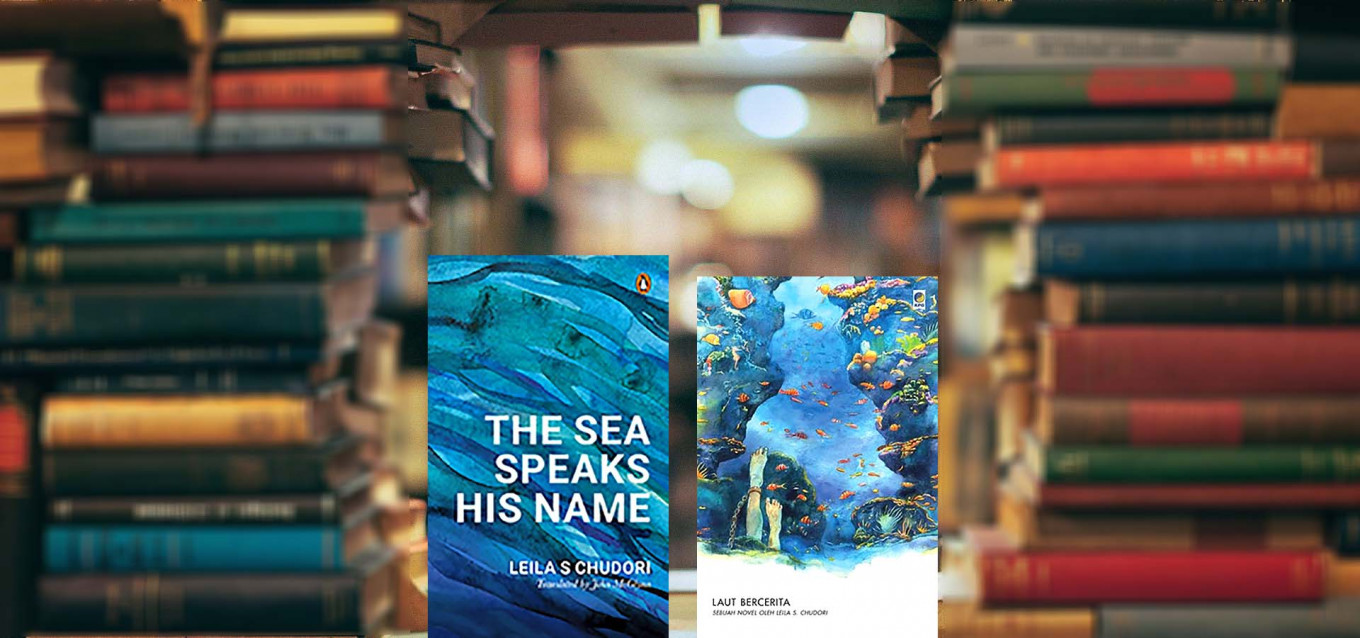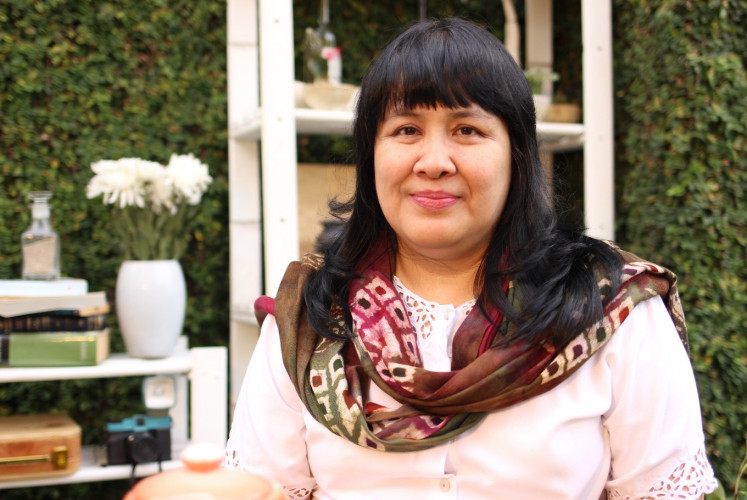Popular Reads
Top Results
Can't find what you're looking for?
View all search resultsPopular Reads
Top Results
Can't find what you're looking for?
View all search resultsLeila S. Chudori: Weaving family drama into political saga
Author Leila S. Chudori finds herself deeply grateful to have been named the Indonesian winner of this year’s Southeast Asian Writers award.
Change text size
Gift Premium Articles
to Anyone
W
inning the 2020 Southeast Asian Writers Award for her novel Laut Bercerita (The Sea Speaks his Name), did not bring peace of mind for author and journalist Leila S. Chudori.
The novel, published in December 2017 and inspired by real events, tells the story of activists who were kidnapped, tortured and forcibly disappeared during the 1998 protests leading to the downfall of the totalitarian New Order regime, as well as the aftermath for the activists’ families.
The English version of Leila’s novel, translated by John H. McGlynn, was published by Penguin Random House SEA in February 2020. It has also been adapted into a 30-minute eponymous short film by director Pritagita Arianegara, starring Reza Rahadian and Dian Sastrowardoyo, among others.
However, the case remains unresolved to this day.
“Actually, before I die, I would like to see this case resolved,” the 57-year-old told The Jakarta Post in a video call interview.
“When I was still a full-time journalist for the news magazine Tempo, I was meeting the parents of these missing activists. They really want to know what is truly going on with their children. Nothing kills you more than being put in limbo like this.”
The annual literary award, established in 1979, is given to Southeast Asian writers. Past Indonesian recipients include Eka Kurniawan, Nirwan Dewanto, Linda Christanty, Budi Darma and Seno Gumira Ajidarma.
Leila said she was deeply concerned about the issue as it hit her close to home being a literary writer, a journalist and a mother – parts of herself that she could not set apart. Her daughter, Rain Chudori, also follows in her footsteps as a literary writer.
Born in Jakarta on Dec. 12, 1962, she earned a bachelor’s degree in political science and comparative development studies from Trent University, Canada in 1988. She joined Tempo as a reporter in 1989 and stayed true to her profession until she retired from the news magazine in late 2017.
She started publishing short stories when she was 12 in the year 1974, in popular Indonesian children’s magazines, most notably Si Kuncung.
Her official bibliography includes two short story collections, Malam Terakhir (The Final Night) and 9 dari Nadira (Nine Stories from Nadira), as well as two novels: Pulang (Home; English translation by John H. McGlynn) and Laut Bercerita.
Although Pulang and Laut Bercerita are both set within the context of two major political upheavals in Indonesia – the 1965 tragedy and the downfall of the New Order regime in 1998 – they center mainly on the main characters’ family drama – a topic Leila is endlessly fascinated by.
Storyteller: Author Leila S. Chudori has been named the Indonesian winner of this year’s Southeast Asian Writers award. (Courtesy of Faizal Amiru /-)Family drama is also the centerpiece of her short story anthologies.
“You might be born into the same family, earning the same kind of education, eating the same food every day yet you can turn out to be a very different person from your siblings,” Leila says.
“A person can turn into a deeply religious individual, while her sibling can become an extremely liberal person, all in the same family, can you imagine what will happen when they meet?” she continued, while mentioning Umar Kayam’s prose as excellent examples of how personality and political differences can play out in a family.
She said that during the 2014 and 2019 elections in Indonesia, such division ran deep, causing siblings to turn against each other simply because they were voting for a different presidential candidate.
Leila is currently working on two novels. Namaku Alam (My Name is Alam) is the rough coming-of-age story of Segara Alam from her novel Pulang, who had to bear the stigma of being the child of a political prisoner.
The other novel is about a murderer who targets perpetrators of crimes against humanity, a subject born out of her frustration with the systemic injustice occurring in Indonesia.
Then, on a lighter note, she is also writing a food-themed short story collection.
“We’ll see which one gets finished first,” she said, smiling.
She likes to listen to 1960s music by Led Zeppelin and David Bowie, among others, to energize her writing projects.
Leila is also a movie buff. She was especially impressed by Joon-ho Bong’s 2019 movie Parasite. “You know me, I love family stories. This is a story of how a family has to survive economically, with a touch of social class issues.”
Her deep understanding of politics and history cannot be separated from her experience working for 28 years as a Tempo journalist, where she spent a major portion of her early career as an international affairs reporter.
She has covered the Philippines under former president Corazon Aquino several times. She also got an exclusive interview with South African leader Nelson Mandela when he visited Indonesia in 1990, after he was released from prison and before he became South African president in 1995.
“I followed him while he was visiting the Asia-Africa conference photo exhibit, then I greeted him using the local term amandla [power], which I learned from my African friends at an IB senior school in Canada. He looked surprised and eventually granted my interview request,” she reminisced.
Currently, in her retirement, she is busy handling her weekly programs, including a podcast called Coming Home with Leila S. Chudori in which she dissects literary works with prominent writers, filmmakers and actresses as interviewees.
Her work with the podcast is no different from her work in journalism: she has to read books that will be dissected in the podcast as part of her research to be able to interview her sources in depth.
The other is a film review series called Layar Bersama Leila S. Chudori (Screen time with Leila S. Chudori), broadcast via Tempo.co’s YouTube channel featuring filmmakers, writers and actors.
Leila is also known as Tempo’s resident film critic, writing her first review – of 1989 Joel Schumacher film Cousins – for the magazine to fill the slot usually reserved for more senior journalists like Goenawan Mohamad, Isma Sawitri and Putu Wijaya. Her editors liked the review and the rest is history.
She has also been busy passing her knowledge forward by teaching various creative writing classes. She said her deepest satisfaction lay in seeing her students grow their skills.
Leila said she had always been guided in everything she did by what her late father, journalist Muhammad Chudori, once told her: “Do not ever treat what you do as a job, treat it as something that gives you pleasure”.
Apparently, just by listening to her stories, you can tell that Leila has a great time doing what she does best as a writer and journalist. (ste)












